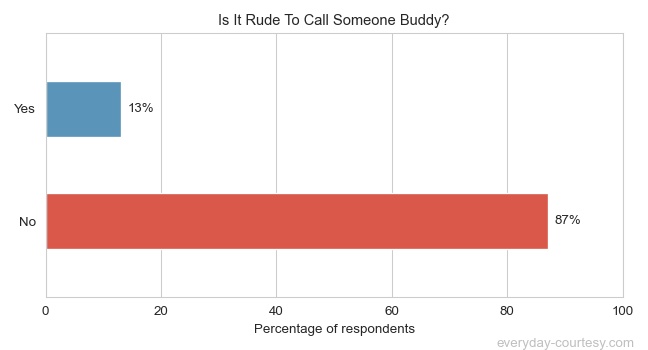People will often call a stranger buddy when they’re at the park, the beach, or even a gas station. But, is it rude to call someone “Buddy” / “Pal”?

The term buddy has a positive connotation for most people and can therefore be used in many situations without any problems if you are close to the person in question. Formal situations, especially in the work environment, are an exception to this.
This article will explain why it’s not regarded as rude to use the term in a greeting or conversation.
Survey Results
In our recent survey of 105 people in the United States, 87% thought that it was not rude to call someone buddy, while 13% did.

Typically, it’s not rude to call someone buddy, but the term’s appropriateness may depend on who you are speaking to and the circumstances.
For example, if you’re a younger person speaking to someone who could be your grandparent, it may be cautious to be careful with your use of the term buddy.
Sometimes older people see that level of familiarity as disrespectful to them. If you live in an area where the tradition is to refer to other people as Sir or Ma’am, it’s better to avoid using “Buddy”.
In most business situations, it’s usually better to avoid referring to a stranger as “Buddy”.
Don’t refer to your boss as a buddy and avoid referring to people who you’re supervising as a buddy. If you’re in a meeting, be careful how you use the term.
Unless it’s a part of your business culture, don’t use buddy in a professional setting. Remember, 13% of the survey respondents thought that it was rude to call a person buddy. You never want to take the chance that your boss, a business partner, or a prospective client might be one of the people who is offended by the term.
Asking For A Favor
It’s important to address someone properly when you’re asking them for a favor. If you’re in a situation where you need help and you want to call on the person’s humanity, you may refer to them as buddy or friend. It could be a serious situation or one where the help you need is nothing major.
You want to make the other person see you as another human being and feel more comfortable with assisting you.
For example, you might say:
“Yo buddy, my tire is flat. Would you happen to have a lug tool? “
“Buddy, could you keep an eye on my lawnmower for a minute. I’m stepping right over there to grab that can of gas.”
“Buddy, would you happen to know whether Ty’s Hardware is on this street?”
Referring To Friends
People usually don’t take offense to the word buddy if it’s actually being used to refer to someone who is actually a friend.
If you’re talking about something that happened while you were with a friend and you refer to them as your buddy, that’s not rude.
Buddy may also be used to refer to someone who is nearby. You might also talk about your plans or make any type of reference in conversation with a friend.
In any of these situations, it’s not seen as rude or condescending because the person is actually your friend.
For example, you might say:
“That’s my buddy’s store.”
“My buddy Tim saw a van twice as fast as that the other day.”
“My buddy Kit used to race bikes but he stopped when he became a father.”
“My buddy Jasper and I are planning to start a delivery service.”
Protecting Privacy
The use of the word buddy is understood as being polite in situations where you want to share a bit of information but may not necessarily want to give details such as the person’s name.
If you’re talking about something that could potentially be sensitive but you want to protect the individual’s privacy, you might refer to them as buddies.
This indicates that you really know what you’re talking about and have insight into the situation. it’s used in this way by everyone from politicians to young children.
They may give a hint or share a tiny snippet of information to keep others guessing but don’t share any facts on exactly who they’re talking about.
Even journalists may sometimes do this to protect a source and it’s not thought of as rude.
For example, someone might say:
“My buddy told me that construction is due to start in three weeks!”
“I have a buddy there who has hinted that the leadership structure is about to change.”
“My buddy’s mom works there and he says they put real grape juice in it.”
Affirming Strong Alliances
Buddy is not considered rude if it’s being used to affirm a strong alliance. For example, if you’re having coffee or sharing a meal with people who have been your friends for years, you might use buddy now and then while conversing with them.
Your repeated use of the word buddy affirms that your relationship with them is not the same as that of an associate or a work colleague.
For many people, the word buddy is used for the strongest of friendships, the people they can rely on upon through thick and thin.
For several people, someone they consider a buddy is someone they can call on in their greatest time of need. This is a person who is a true friend, who will pick them up at the airport if their own car breaks down.
This is the person who will deliver a meal if they’re too sick to cook for themselves.
A Term of Respect and Honor
In the modern world, people struggle to keep pace with all the demands of life. They work hard to pay the bills, find a good place to live, find a loving partner and even raise their children.
In all of this, friendships sometimes get placed on the back burner.
Through it all, however, buddies stick with each other and don’t harbor resentment, even when they may only talk to each other once a month or less. In this context, the term buddy is a mark of respect.
The term “Buddy” signifies that this is a person who you trust, who has been with you through life’s ups and downs and is committed to being your friend.

Matt Vargas is an author and public speaking coach with a degree in sociology and more than ten years of practical experience. Matt is responsible for the empirical surveys at everyday-courtesy.com, is a passionate recreational musician, and blogs here about his experiences in the field of interpersonal communication.

